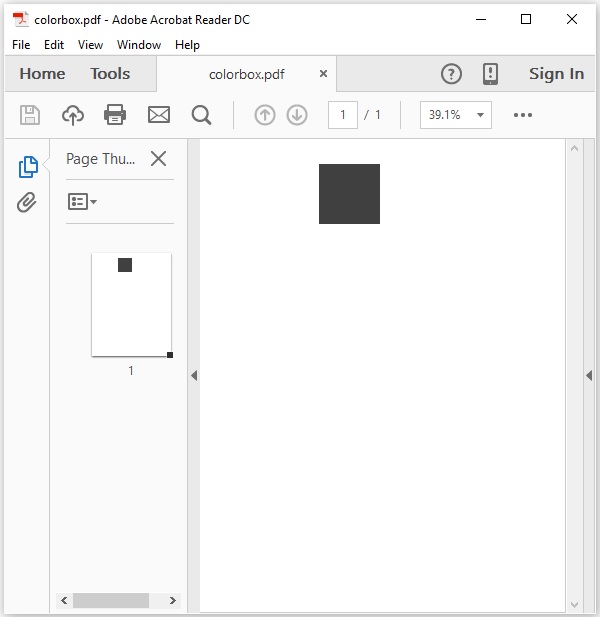PDFBox 快速指南
PDFBox - 概述
可移植文档格式 (PDF) 是一种文件格式,有助于以独立于应用程序软件、硬件和操作系统的形式呈现数据。
每个 PDF 文件都包含固定布局平面文档的描述,包括文本、字体、图形以及显示它所需的其他信息。
有几个库可用于通过程序创建和操作 PDF 文档,例如:
Adobe PDF 库 - 此库提供 C++、.NET 和 Java 等语言的 API,使用它我们可以编辑、查看、打印和从 PDF 文档中提取文本。
格式化对象处理器 - 由 XSL 格式化对象驱动的开源打印格式化程序和输出独立格式化程序。主要输出目标是 PDF。
iText - 此库提供 Java、C# 和其他 .NET 语言的 API,使用此库我们可以创建和操作 PDF、RTF 和 HTML 文档。
JasperReports - 这是一款 Java 报表工具,可以生成 PDF 文档中的报表,包括 Microsoft Excel、RTF、ODT、逗号分隔值和 XML 文件。
什么是 PDFBox
Apache PDFBox 是一个开源的 Java 库,支持 PDF 文档的开发和转换。使用此库,您可以开发创建、转换和操作 PDF 文档的 Java 程序。
此外,PDFBox 还包括一个命令行实用程序,用于使用可用的 Jar 文件对 PDF 执行各种操作。
PDFBox 的特性
以下是 PDFBox 的一些显著特性:
提取文本 - 使用 PDFBox,您可以从 PDF 文件中提取 Unicode 文本。
分割和合并 - 使用 PDFBox,您可以将单个 PDF 文件分成多个文件,并将它们合并回单个文件。
填充表单 - 使用 PDFBox,您可以填充文档中的表单数据。
打印 - 使用 PDFBox,您可以使用标准 Java 打印 API 打印 PDF 文件。
另存为图片 - 使用 PDFBox,您可以将 PDF 保存为图像文件,例如 PNG 或 JPEG。
创建 PDF - 使用 PDFBox,您可以通过创建 Java 程序来创建新的 PDF 文件,还可以包含图像和字体。
签名 - 使用 PDFBox,您可以向 PDF 文件添加数字签名。
PDFBox 的应用
以下是 PDFBox 的一些应用:
Apache Nutch - Apache Nutch 是一款开源的网络搜索软件。它建立在 Apache Lucene 的基础上,添加了网络特定的功能,例如爬虫、链接图数据库、HTML 和其他文档格式的解析器等。
Apache Tika - Apache Tika 是一款用于检测和提取各种文档的元数据和结构化文本内容的工具包,它利用现有的解析器库。
PDFBox 的组件
以下是 PDFBox 的四个主要组件:
PDFBox - 这是 PDFBox 的主要部分。它包含与内容提取和操作相关的类和接口。
FontBox - 它包含与字体相关的类和接口,使用这些类我们可以修改 PDF 文档文本的字体。
XmpBox - 它包含处理 XMP 元数据的类和接口。
Preflight - 此组件用于根据 PDF/A-1b 标准验证 PDF 文件。
PDFBox - 环境
安装 PDFBox
以下是下载 Apache PDFBox 的步骤:
步骤 1 - 通过点击以下链接打开Apache PDFBox的主页:https://pdfbox.apache.org/
步骤 2 - 上述链接将带您到如下所示的主页:
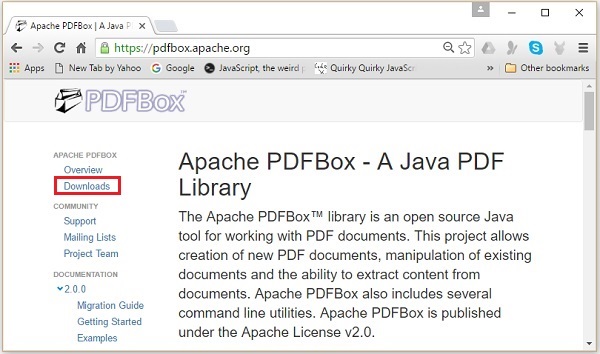
步骤 3 - 现在,点击上面截图中突出显示的下载链接。点击后,您将被引导到 PDFBox 的下载页面,如下面的截图所示。
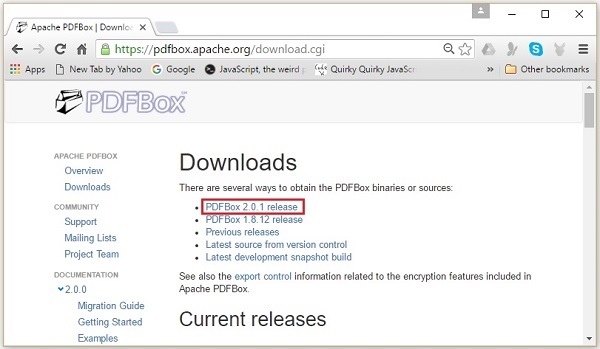
步骤 4 - 在下载页面,您将拥有 PDFBox 的链接。点击最新版本的相应链接。例如,我们选择PDFBox 2.0.1,点击后,您将被引导到所需的 jar 文件,如下面的截图所示。
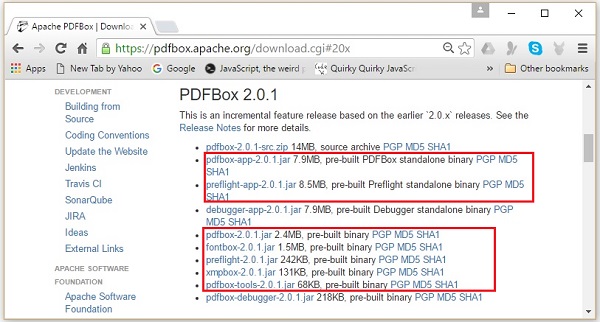
步骤 5 - 下载 jar 文件 pdfbox-2.0.1.jar、fontbox-2.0.1.jar、preflight-2.0.1.jar、xmpbox-2.0.1.jar 和 pdfbox-tools-2.0.1.jar。
Eclipse 安装
下载所需的 jar 文件后,您必须将这些 JAR 文件嵌入到您的 Eclipse 环境中。您可以通过将这些 JAR 文件的构建路径设置为这些 JAR 文件,并通过使用pom.xml来实现。
设置构建路径
以下是将 PDFBox 安装到 Eclipse 中的步骤:
步骤 1 - 确保您已在系统中安装了 Eclipse。如果没有,请在您的系统中下载并安装 Eclipse。
步骤 2 - 打开 Eclipse,点击文件,新建,并打开一个新的项目,如下面的截图所示。
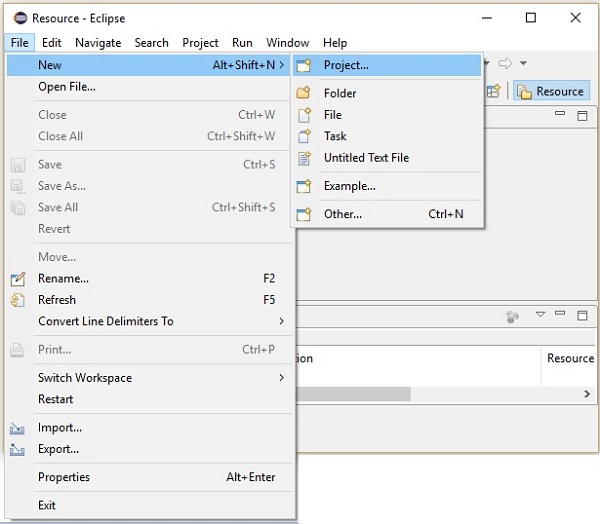
步骤 3 - 选择项目后,您将获得新建项目向导。在此向导中,选择 Java 项目,然后点击下一步按钮继续,如下面的截图所示。
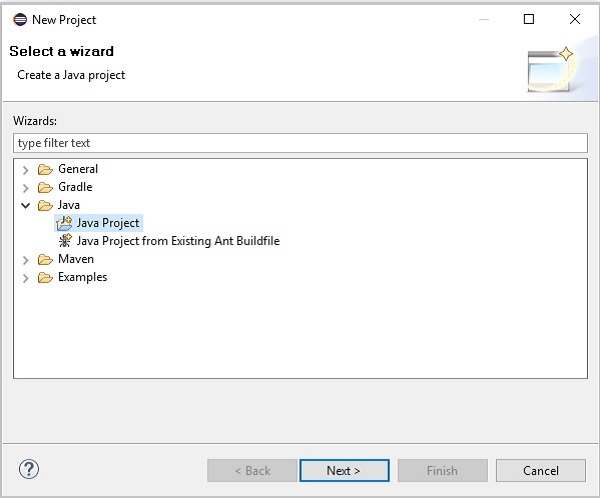
步骤 4 - 继续前进,您将被引导到新建 Java 项目向导。创建一个新项目,然后点击下一步,如下面的截图所示。
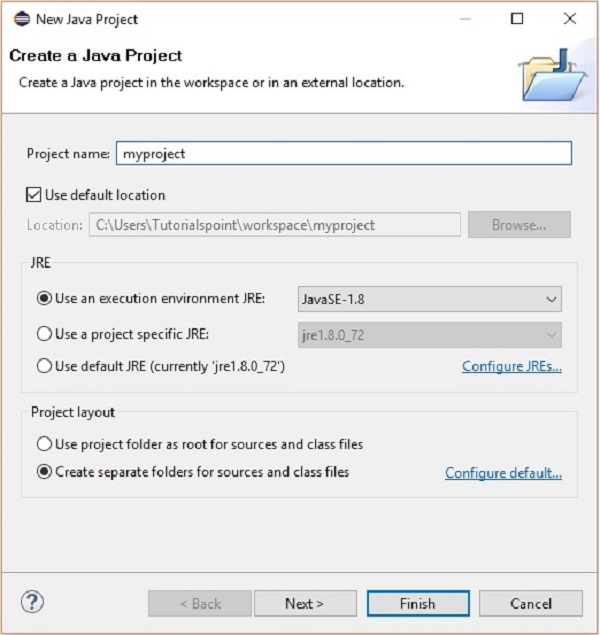
步骤 5 - 创建新项目后,右键单击它;选择构建路径,然后点击配置构建路径…,如下面的截图所示。
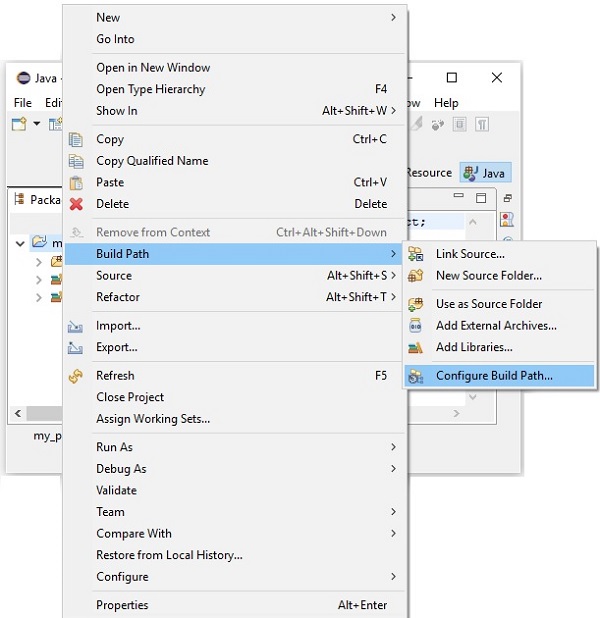
步骤 6 - 点击构建路径选项后,您将被引导到Java 构建路径向导。选择添加外部 JARs,如下面的截图所示。
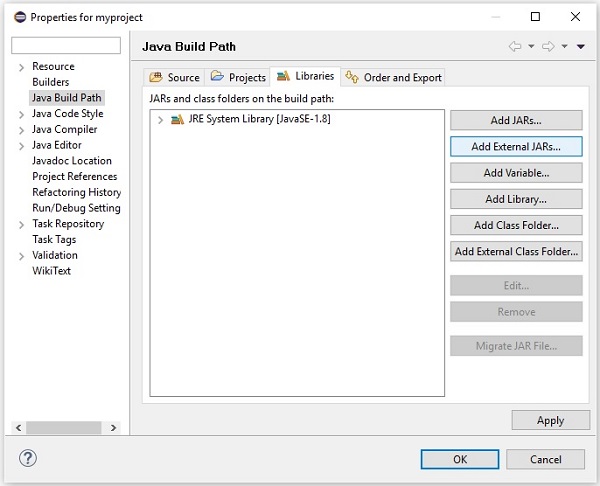
步骤 7 - 选择 jar 文件fontbox-2.0.1.jar、pdfbox-2.0.1.jar、pdfbox-tools-2.0.1.jar、preflight-2.0.1.jar、xmpbox-2.0.1.jar,如下面的截图所示。
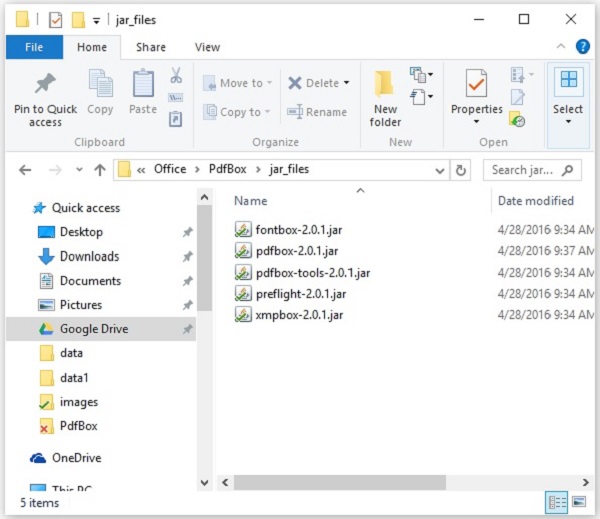
步骤 8 - 点击上面截图中的打开按钮,这些文件将被添加到您的库中,如下面的截图所示。
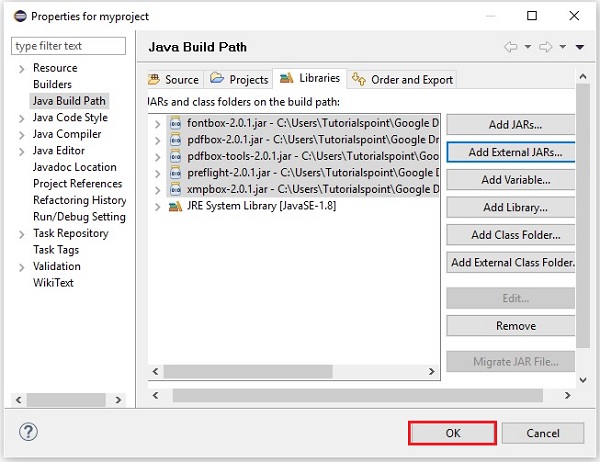
步骤 9 - 点击确定,您将成功地将所需的 JAR 文件添加到当前项目中,您可以通过展开引用库来验证这些添加的库,如下面的截图所示。
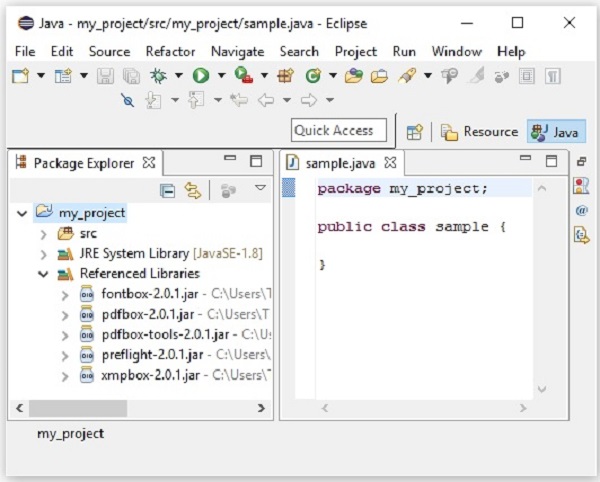
使用 pom.xml
将项目转换为 Maven 项目,并将以下内容添加到其pom.xml中。
<project xmlns="https://maven.apache.org/POM/4.0.0"
xmlns:xsi="https://www.w3.org/2001/XMLSchema-instance"
xsi:schemaLocation="https://maven.apache.org/POM/4.0.0
https://maven.apache.org/xsd/maven-4.0.0.xsd">
<modelVersion>4.0.0</modelVersion>
<groupId>my_project</groupId>
<artifactId>my_project</artifactId>
<version>0.0.1-SNAPSHOT</version>
<build>
<sourceDirectory>src</sourceDirectory>
<plugins>
<plugin>
<artifactId>maven-compiler-plugin</artifactId>
<version>3.3</version>
<configuration>
<source>1.8</source>
<target>1.8</target>
</configuration>
</plugin>
</plugins>
</build>
<dependencies>
<dependency>
<groupId>org.apache.pdfbox</groupId>
<artifactId>pdfbox</artifactId>
<version>2.0.1</version>
</dependency>
<dependency>
<groupId>org.apache.pdfbox</groupId>
<artifactId>fontbox</artifactId>
<version>2.0.0</version>
</dependency>
<dependency>
<groupId>org.apache.pdfbox</groupId>
<artifactId>jempbox</artifactId>
<version>1.8.11</version>
</dependency>
<dependency>
<groupId>org.apache.pdfbox</groupId>
<artifactId>xmpbox</artifactId>
<version>2.0.0</version>
</dependency>
<dependency>
<groupId>org.apache.pdfbox</groupId>
<artifactId>preflight</artifactId>
<version>2.0.0</version>
</dependency>
<dependency>
<groupId>org.apache.pdfbox</groupId>
<artifactId>pdfbox-tools</artifactId>
<version>2.0.0</version>
</dependency>
</dependencies>
</project>
PDFBox - 创建 PDF 文档
现在让我们了解如何使用 PDFBox 库创建 PDF 文档。
创建空 PDF 文档
您可以通过实例化PDDocument类来创建一个空的 PDF 文档。您可以使用Save()方法将文档保存到您想要的路径。
以下是创建空 PDF 文档的步骤。
步骤 1:创建空文档
属于包org.apache.pdfbox.pdmodel的PDDocument类是 PDFDocument 的内存表示。因此,通过实例化此类,您可以创建一个空的 PDFDocument,如下面的代码块所示。
PDDocument document = new PDDocument();
步骤 2:保存文档
创建文档后,您需要将此文档保存到所需的路径中,您可以使用PDDocument类的Save()方法来做到这一点。此方法接受一个字符串值作为参数,该字符串值表示您要存储文档的路径。以下是PDDocument类的 save() 方法的原型。
document.save("Path");
步骤 3:关闭文档
当您的任务完成后,最后,您需要使用close ()方法关闭PDDocument对象。以下是PDDocument类的 close() 方法的原型。
document.close();
示例
此示例演示了 PDF 文档的创建。在这里,我们将创建一个 Java 程序来生成一个名为my_doc.pdf的 PDF 文档并将其保存到路径C:/PdfBox_Examples/中。将此代码保存在名为Document_Creation.java的文件中。
import java.io.IOException;
import org.apache.pdfbox.pdmodel.PDDocument;
public class Document_Creation {
public static void main (String args[]) throws IOException {
//Creating PDF document object
PDDocument document = new PDDocument();
//Saving the document
document.save("C:/PdfBox_Examples/my_doc.pdf");
System.out.println("PDF created");
//Closing the document
document.close();
}
}
使用以下命令从命令提示符编译并执行保存的 Java 文件。
javac Document_Creation.java java Document_Creation
执行后,上述程序创建一个 PDF 文档,显示以下消息。
PDF created
如果您验证指定的路径,您可以在下面看到创建的 PDF 文档。
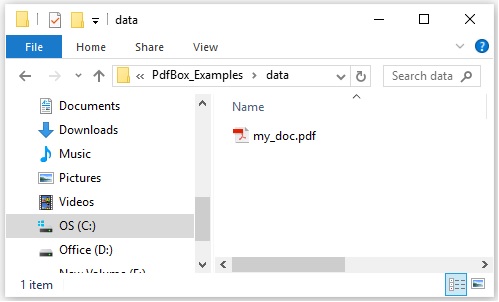
由于这是一个空文档,如果您尝试打开此文档,它会提示您显示一条错误消息,如下面的截图所示。
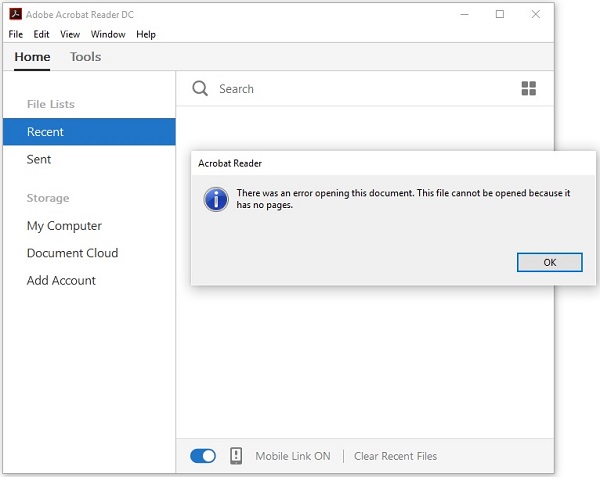
PDFBox - 添加页面
在上一章中,我们了解了如何创建 PDF 文档。创建 PDF 文档后,您需要向其中添加页面。现在让我们了解如何在 PDF 文档中添加页面。
向 PDF 文档添加页面
您可以通过实例化PDPage类来创建一个空页面,并使用PDDocument类的addPage()方法将其添加到 PDF 文档中。
以下是创建空文档并向其中添加页面的步骤。
步骤 1:创建空文档
通过实例化PDDocument类来创建一个空的 PDF 文档,如下所示。
PDDocument document = new PDDocument();
步骤 2:创建空白页面
PDPage类表示PDF文档中的一个页面,因此,您可以通过实例化此类来创建一个空页面,如下面的代码块所示。
PDPage my_page = new PDPage();
步骤 3:将页面添加到文档
您可以使用PDDocument类的addPage()方法将页面添加到 PDF 文档中。为此方法,您需要将 PDPage 对象作为参数传递。
因此,将上一步中创建的空白页面添加到 PDDocument 对象中,如下面的代码块所示。
document.addPage(my_page);
这样,您可以向 PDF 文档添加任意数量的页面。
步骤 4:保存文档
添加所有页面后,使用PDDocument类的save()方法保存 PDF 文档,如下面的代码块所示。
document.save("Path");
步骤 5:关闭文档
最后,使用PDDocument类的close()方法关闭文档,如下所示。
document.close();
示例
此示例演示了如何创建 PDF 文档并向其中添加页面。在这里,我们将创建一个名为my_doc.pdf的 PDF 文档,并进一步向其中添加 10 个空白页面,并将其保存到路径C:/PdfBox_Examples/中。将此代码保存在名为Adding_pages.java的文件中。
package document;
import java.io.IOException;
import org.apache.pdfbox.pdmodel.PDDocument;
import org.apache.pdfbox.pdmodel.PDPage;
public class Adding_Pages {
public static void main(String args[]) throws IOException {
//Creating PDF document object
PDDocument document = new PDDocument();
for (int i=0; i<10; i++) {
//Creating a blank page
PDPage blankPage = new PDPage();
//Adding the blank page to the document
document.addPage( blankPage );
}
//Saving the document
document.save("C:/PdfBox_Examples/my_doc.pdf");
System.out.println("PDF created");
//Closing the document
document.close();
}
}
使用以下命令从命令提示符编译并执行保存的 Java 文件:
javac Adding_pages.java java Adding_pages
执行后,上述程序创建一个包含空白页面的 PDF 文档,显示以下消息:
PDF created
如果您验证指定的路径,您可以在下面的截图中找到创建的 PDF 文档。
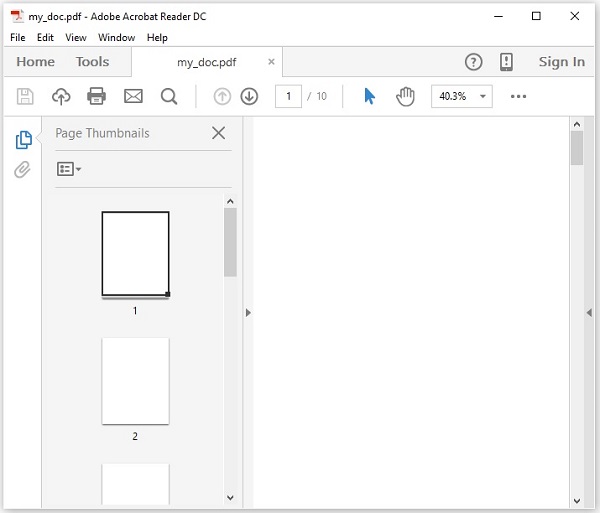
PDFBox - 加载文档
在前面的示例中,您已经了解了如何创建新文档并向其中添加页面。本章将教您如何加载系统中已存在的 PDF 文档,并在其上执行一些操作。
加载现有的 PDF 文档
PDDocument 类的 load() 方法用于加载现有的 PDF 文档。请按照以下步骤加载现有的 PDF 文档。
步骤 1:加载现有的 PDF 文档
使用 PDDocument 类的静态方法 load() 加载现有的 PDF 文档。此方法接受文件对象作为参数,由于这是一个静态方法,因此您可以使用类名来调用它,如下所示。
File file = new File("path of the document")
PDDocument.load(file);
步骤 2:执行所需的操作
执行所需的操作,例如向加载的文档添加页面、添加文本、添加图像。
步骤 3:保存文档
添加所有页面后,使用PDDocument类的save()方法保存 PDF 文档,如下面的代码块所示。
document.save("Path");
步骤 4:关闭文档
最后,使用PDDocument类的close()方法关闭文档,如下所示。
document.close();
示例
假设我们有一个 PDF 文档,它包含一个页面,路径为 C:/PdfBox_Examples/,如下面的屏幕截图所示。
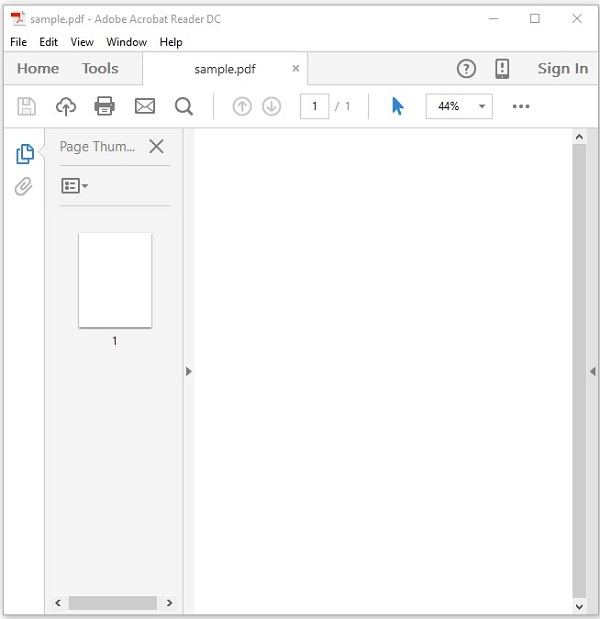
此示例演示如何加载现有的 PDF 文档。在这里,我们将加载上面显示的 PDF 文档 sample.pdf,向其中添加一个页面,并将其保存在同一路径下,使用相同的名称。
步骤 1 - 将此代码保存在名为 LoadingExistingDocument.java 的文件中。
import java.io.File;
import java.io.IOException;
import org.apache.pdfbox.pdmodel.PDDocument;
import org.apache.pdfbox.pdmodel.PDPage;
public class LoadingExistingDocument {
public static void main(String args[]) throws IOException {
//Loading an existing document
File file = new File("C:/PdfBox_Examples/sample.pdf");
PDDocument document = PDDocument.load(file);
System.out.println("PDF loaded");
//Adding a blank page to the document
document.addPage(new PDPage());
//Saving the document
document.save("C:/PdfBox_Examples/sample.pdf");
//Closing the document
document.close();
}
}
使用以下命令从命令提示符编译并执行保存的 Java 文件
javac LoadingExistingDocument.java java LoadingExistingDocument
执行后,上述程序加载指定的 PDF 文档并向其添加一个空白页面,显示以下消息。
PDF loaded
如果验证指定的路径,您可以找到添加到指定 PDF 文档中的一个额外页面,如下所示。
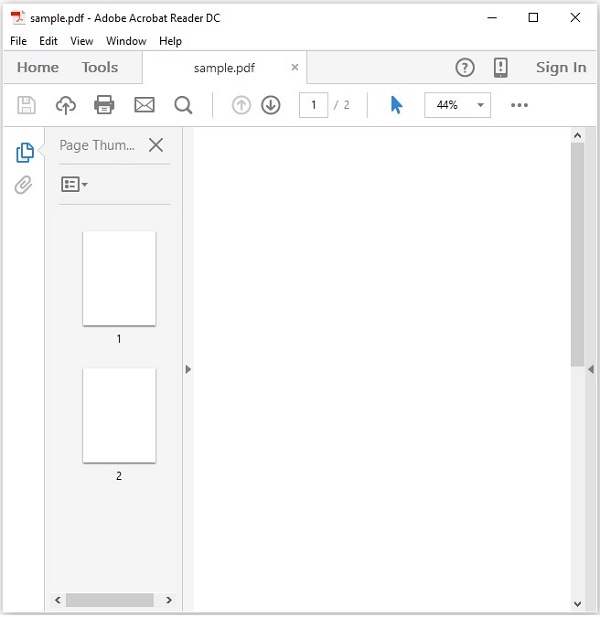
PDFBox - 删除页面
现在让我们学习如何从 PDF 文档中删除页面。
从现有文档中删除页面
您可以使用 PDDocument 类的 removePage() 方法从现有的 PDF 文档中删除页面。
步骤 1:加载现有的 PDF 文档
使用 PDDocument 类的静态方法 load() 加载现有的 PDF 文档。此方法接受文件对象作为参数,由于这是一个静态方法,因此您可以使用类名来调用它,如下所示。
File file = new File("path of the document")
PDDocument.load(file);
步骤 2:列出页面数量
您可以使用 getNumberOfPages() 方法列出 PDF 文档中存在的页面数量,如下所示。
int noOfPages= document.getNumberOfPages(); System.out.print(noOfPages);
步骤 3:删除页面
您可以使用 PDDocument 类的 removePage() 方法从 PDF 文档中删除页面。对于此方法,您需要传递要删除的页面的索引。
在为 PDF 文档中的页面指定索引时,请记住这些页面的索引从零开始,即,如果要删除第 1 页,则索引值需要为 0。
document.removePage(2);
步骤 4:保存文档
删除页面后,使用 PDDocument 类的 save() 方法保存 PDF 文档,如下面的代码块所示。
document.save("Path");
步骤 5:关闭文档
最后,使用 PDDocument 类的 close() 方法关闭文档,如下所示。
document.close();
示例
假设我们有一个名为 sample.pdf 的 PDF 文档,它包含三个空白页面,如下所示。
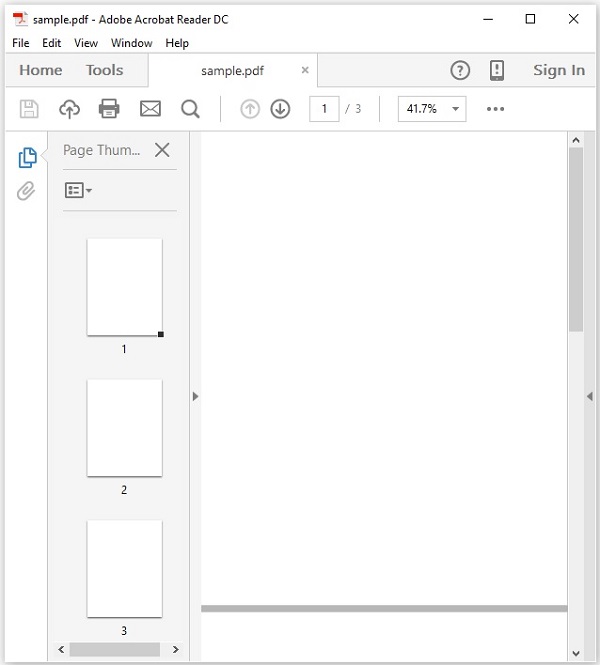
此示例演示如何从现有的 PDF 文档中删除页面。在这里,我们将加载上面指定的名为 sample.pdf 的 PDF 文档,从中删除一个页面,并将其保存在 C:/PdfBox_Examples/ 路径中。将此代码保存在名为 Removing_pages.java 的文件中。
import java.io.File;
import java.io.IOException;
import org.apache.pdfbox.pdmodel.PDDocument;
public class RemovingPages {
public static void main(String args[]) throws IOException {
//Loading an existing document
File file = new File("C:/PdfBox_Examples/sample.pdf");
PDDocument document = PDDocument.load(file);
//Listing the number of existing pages
int noOfPages= document.getNumberOfPages();
System.out.print(noOfPages);
//Removing the pages
document.removePage(2);
System.out.println("page removed");
//Saving the document
document.save("C:/PdfBox_Examples/sample.pdf");
//Closing the document
document.close();
}
}
使用以下命令从命令提示符编译并执行保存的 Java 文件。
javac RemovingPages.java java RemovingPages
执行后,上述程序创建一个包含空白页面的 PDF 文档,显示以下消息。
3 page removed
如果验证指定的路径,您可以发现所需的页面已被删除,并且文档中只剩下两页,如下所示。
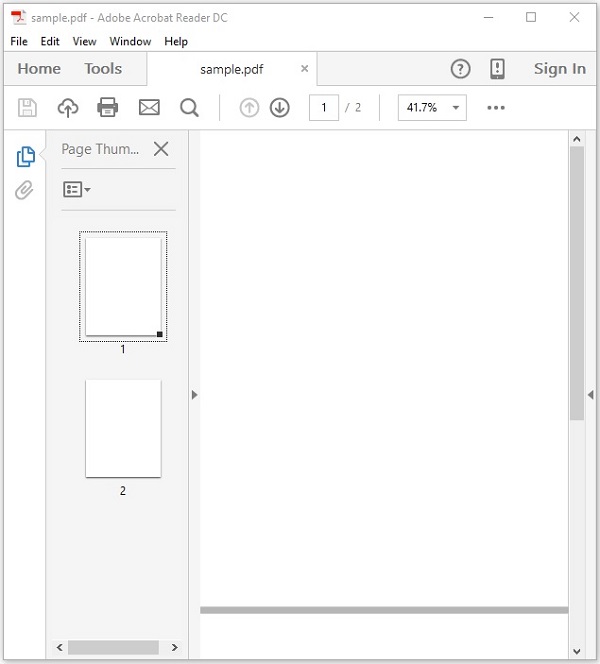
PDFBox - 文档属性
与其他文件一样,PDF 文档也具有文档属性。这些属性是键值对。每个属性都提供有关文档的特定信息。
以下是 PDF 文档的属性:
| 序号 | 属性及描述 |
|---|---|
| 1 | 文件 此属性保存文件名称。 |
| 2 | 标题 使用此属性,您可以为文档设置标题。 |
| 3 | 作者 使用此属性,您可以为文档设置作者姓名。 |
| 4 | 主题 使用此属性,您可以指定 PDF 文档的主题。 |
| 5 | 关键词 使用此属性,您可以列出我们可以搜索文档的关键词。 |
| 6 | 创建日期 使用此属性,您可以设置文档的创建日期。 |
| 7 | 修改日期 使用此属性,您可以设置文档的修改日期。 |
| 8 | 应用程序 使用此属性,您可以设置文档的应用程序。 |
以下是 PDF 文档的文档属性表的屏幕截图。
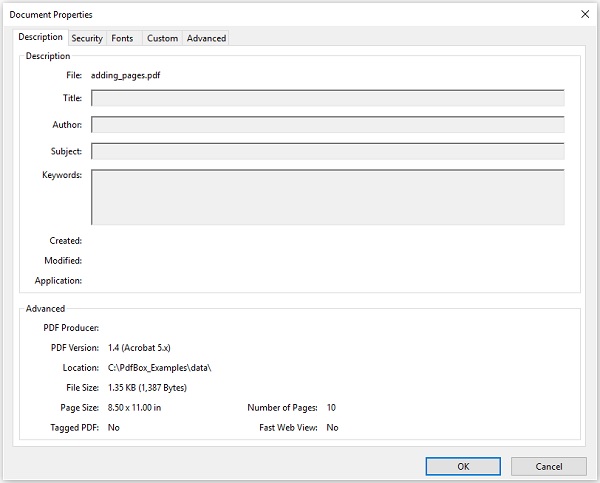
设置文档属性
PDFBox 为您提供了一个名为 PDDocumentInformation 的类。此类具有一组 setter 和 getter 方法。
此类的 setter 方法用于为文档的各种属性设置值,getter 方法用于检索这些值。
以下是 PDDocumentInformation 类的 setter 方法。
| 序号 | 方法及描述 |
|---|---|
| 1 | setAuthor(String author) 此方法用于设置名为 Author 的 PDF 文档属性的值。 |
| 2 | setTitle(String title) 此方法用于设置名为 Title 的 PDF 文档属性的值。 |
| 3 | setCreator(String creator) 此方法用于设置名为 Creator 的 PDF 文档属性的值。 |
| 4 | setSubject(String subject) 此方法用于设置名为 Subject 的 PDF 文档属性的值。 |
| 5 | setCreationDate(Calendar date) 此方法用于设置名为 CreationDate 的 PDF 文档属性的值。 |
| 6 | setModificationDate(Calendar date) 此方法用于设置名为 ModificationDate 的 PDF 文档属性的值。 |
| 7 | setKeywords(String keywords list) 此方法用于设置名为 Keywords 的 PDF 文档属性的值。 |
示例
PDFBox 提供了一个名为 PDDocumentInformation 的类,此类提供了各种方法。这些方法可以为文档设置各种属性并检索它们。
此示例演示如何向 PDF 文档添加属性,例如 Author、Title、Date 和 Subject。在这里,我们将创建一个名为 doc_attributes.pdf 的 PDF 文档,向其中添加各种属性,并将其保存在 C:/PdfBox_Examples/ 路径中。将此代码保存在名为 AddingAttributes.java 的文件中。
import java.io.IOException;
import java.util.Calendar;
import java.util.GregorianCalendar;
import org.apache.pdfbox.pdmodel.PDDocument;
import org.apache.pdfbox.pdmodel.PDDocumentInformation;
import org.apache.pdfbox.pdmodel.PDPage;
public class AddingDocumentAttributes {
public static void main(String args[]) throws IOException {
//Creating PDF document object
PDDocument document = new PDDocument();
//Creating a blank page
PDPage blankPage = new PDPage();
//Adding the blank page to the document
document.addPage( blankPage );
//Creating the PDDocumentInformation object
PDDocumentInformation pdd = document.getDocumentInformation();
//Setting the author of the document
pdd.setAuthor("Tutorialspoint");
// Setting the title of the document
pdd.setTitle("Sample document");
//Setting the creator of the document
pdd.setCreator("PDF Examples");
//Setting the subject of the document
pdd.setSubject("Example document");
//Setting the created date of the document
Calendar date = new GregorianCalendar();
date.set(2015, 11, 5);
pdd.setCreationDate(date);
//Setting the modified date of the document
date.set(2016, 6, 5);
pdd.setModificationDate(date);
//Setting keywords for the document
pdd.setKeywords("sample, first example, my pdf");
//Saving the document
document.save("C:/PdfBox_Examples/doc_attributes.pdf");
System.out.println("Properties added successfully ");
//Closing the document
document.close();
}
}
使用以下命令从命令提示符编译并执行保存的 Java 文件。
javac AddingAttributes.java java AddingAttributes
执行后,上述程序将所有指定的属性添加到文档中,显示以下消息。
Properties added successfully
现在,如果您访问给定的路径,您可以在其中找到创建的 PDF。右键单击文档并选择文档属性选项,如下所示。
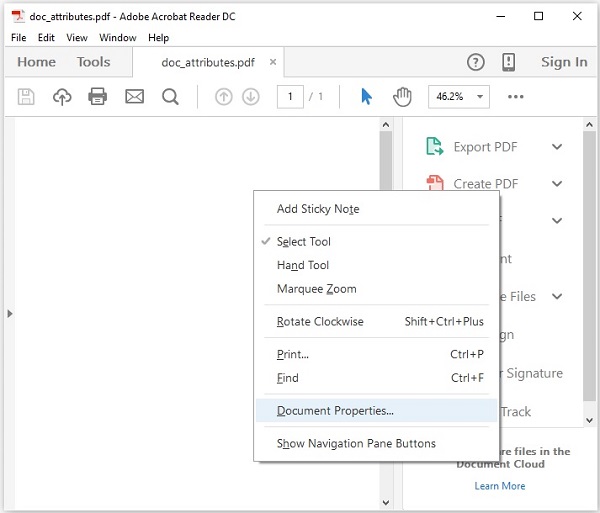
这将为您提供文档属性窗口,在这里您可以观察到文档的所有属性都已设置为指定的值。
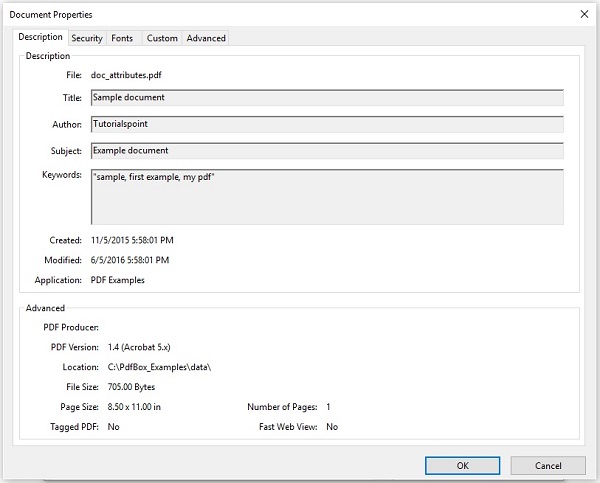
检索文档属性
您可以使用 PDDocumentInformation 类提供的 getter 方法检索文档的属性。
以下是 PDDocumentInformation 类的 getter 方法。
| 序号 | 方法及描述 |
|---|---|
| 1 | getAuthor() 此方法用于检索名为 Author 的 PDF 文档属性的值。 |
| 2 | getTitle() 此方法用于检索名为 Title 的 PDF 文档属性的值。 |
| 3 | getCreator() 此方法用于检索名为 Creator 的 PDF 文档属性的值。 |
| 4 | getSubject() 此方法用于检索名为 Subject 的 PDF 文档属性的值。 |
| 5 | getCreationDate() 此方法用于检索名为 CreationDate 的 PDF 文档属性的值。 |
| 6 | getModificationDate() 此方法用于检索名为 ModificationDate 的 PDF 文档属性的值。 |
| 7 | getKeywords() 此方法用于检索名为 Keywords 的 PDF 文档属性的值。 |
示例
此示例演示如何检索现有 PDF 文档的属性。在这里,我们将创建一个 Java 程序并加载名为 doc_attributes.pdf 的 PDF 文档(保存在 C:/PdfBox_Examples/ 路径中),并检索其属性。将此代码保存在名为 RetrivingDocumentAttributes.java 的文件中。
import java.io.File;
import java.io.IOException;
import org.apache.pdfbox.pdmodel.PDDocument;
import org.apache.pdfbox.pdmodel.PDDocumentInformation;
public class RetrivingDocumentAttributes {
public static void main(String args[]) throws IOException {
//Loading an existing document
File file = new File("C:/PdfBox_Examples/doc_attributes.pdf")
PDDocument document = PDDocument.load(file);
//Getting the PDDocumentInformation object
PDDocumentInformation pdd = document.getDocumentInformation();
//Retrieving the info of a PDF document
System.out.println("Author of the document is :"+ pdd.getAuthor());
System.out.println("Title of the document is :"+ pdd.getTitle());
System.out.println("Subject of the document is :"+ pdd.getSubject());
System.out.println("Creator of the document is :"+ pdd.getCreator());
System.out.println("Creation date of the document is :"+ pdd.getCreationDate());
System.out.println("Modification date of the document is :"+
pdd.getModificationDate());
System.out.println("Keywords of the document are :"+ pdd.getKeywords());
//Closing the document
document.close();
}
}
使用以下命令从命令提示符编译并执行保存的 Java 文件。
javac RetrivingDocumentAttributes.java java RetrivingDocumentAttributes
执行后,上述程序检索文档的所有属性并显示它们,如下所示。
Author of the document is :Tutorialspoint Title of the document is :Sample document Subject of the document is :Example document Creator of the document is :PDF Examples Creation date of the document is :11/5/2015 Modification date of the document is :6/5/2016 Keywords of the document are :sample, first example, my pdf
PDFBox - 添加文本
在上一章中,我们讨论了如何向 PDF 文档添加页面。在本章中,我们将讨论如何向现有的 PDF 文档添加文本。
向现有 PDF 文档添加文本
您可以使用 PDFBox 库向文档添加内容,它为您提供了一个名为 PDPageContentStream 的类,该类包含在 PDFDocument 的页面中插入文本、图像和其他类型内容所需的方法。
以下是创建空文档并在其中向页面添加内容的步骤。
步骤 1:加载现有文档
您可以使用 PDDocument 类的 load() 方法加载现有文档。因此,实例化此类并加载所需的文档,如下所示。
File file = new File("Path of the document");
PDDocument doc = document.load(file);
步骤 2:获取所需的页面
您可以使用 getPage() 方法获取文档中所需的页面。通过将页面的索引传递给此方法来检索所需页面的对象,如下所示。
PDPage page = doc.getPage(1);
步骤 3:准备内容流
您可以使用 PDPageContentStream 类的对象插入各种类型的数据元素。您需要将文档对象和页面对象传递给此类的构造函数,因此,通过传递在先前步骤中创建的这两个对象来实例化此类,如下所示。
PDPageContentStream contentStream = new PDPageContentStream(doc, page);
步骤 4:开始文本
在 PDF 文档中插入文本时,您可以使用 PDPageContentStream 类的 beginText() 和 endText() 方法指定文本的起始和结束点,如下所示。
contentStream.beginText(); ……………………….. code to add text content ……………………….. contentStream.endText();
因此,使用 beginText() 方法开始文本,如下所示。
contentStream.beginText();
步骤 5:设置文本的位置
使用 newLineAtOffset() 方法,您可以在页面上的内容流中设置位置。
//Setting the position for the line contentStream.newLineAtOffset(25, 700);
步骤 6:设置字体
您可以使用 PDPageContentStream 类的 setFont() 方法将文本的字体设置为所需的样式,如下所示。对于此方法,您需要传递字体的类型和大小。
contentStream.setFont( font_type, font_size );
步骤 7:插入文本
您可以使用 PDPageContentStream 类的 ShowText() 方法将文本插入页面,如下所示。此方法接受字符串形式的所需文本。
contentStream.showText(text);
步骤 8:结束文本
插入文本后,您需要使用 PDPageContentStream 类的 endText() 方法结束文本,如下所示。
contentStream.endText();
步骤 9:关闭 PDPageContentStream
使用 close() 方法关闭 PDPageContentStream 对象,如下所示。
contentstream.close();
步骤 10:保存文档
添加所需内容后,使用 PDDocument 类的 save() 方法保存 PDF 文档,如下面的代码块所示。
doc.save("Path");
步骤 11:关闭文档
最后,使用 PDDocument 类的 close() 方法关闭文档,如下所示。
doc.close();
示例
此示例演示如何向文档中的页面添加内容。在这里,我们将创建一个 Java 程序来加载名为 my_doc.pdf 的 PDF 文档(保存在 C:/PdfBox_Examples/ 路径中),并向其中添加一些文本。将此代码保存在名为 AddingContent.java 的文件中。
import java.io.File;
import java.io.IOException;
import org.apache.pdfbox.pdmodel.PDDocument;
import org.apache.pdfbox.pdmodel.PDPage;
import org.apache.pdfbox.pdmodel.PDPageContentStream;
import org.apache.pdfbox.pdmodel.font.PDType1Font;
public class AddingContent {
public static void main (String args[]) throws IOException {
//Loading an existing document
File file = new File("C:/PdfBox_Examples/my_doc.pdf");
PDDocument document = PDDocument.load(file);
//Retrieving the pages of the document
PDPage page = document.getPage(1);
PDPageContentStream contentStream = new PDPageContentStream(document, page);
//Begin the Content stream
contentStream.beginText();
//Setting the font to the Content stream
contentStream.setFont(PDType1Font.TIMES_ROMAN, 12);
//Setting the position for the line
contentStream.newLineAtOffset(25, 500);
String text = "This is the sample document and we are adding content to it.";
//Adding text in the form of string
contentStream.showText(text);
//Ending the content stream
contentStream.endText();
System.out.println("Content added");
//Closing the content stream
contentStream.close();
//Saving the document
document.save(new File("C:/PdfBox_Examples/new.pdf"));
//Closing the document
document.close();
}
}
使用以下命令从命令提示符编译并执行保存的 Java 文件。
javac AddingContent.java java AddingContent
执行后,上述程序将给定的文本添加到文档中并显示以下消息。
Content added
如果验证指定路径中的 PDF 文档 new.pdf,您可以观察到给定的内容已添加到文档中,如下所示。
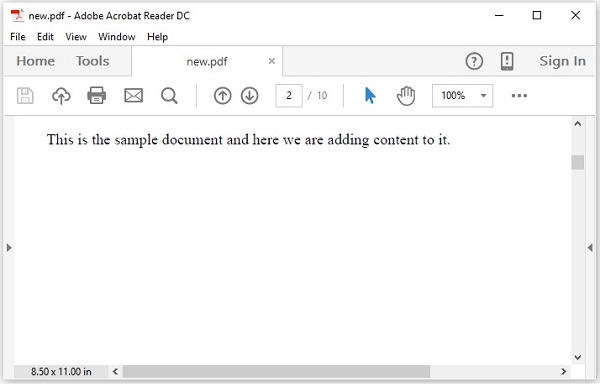
PDFBox - 添加多行文本
在上一章提供的示例中,我们讨论了如何向 PDF 中的页面添加文本,但通过此程序,您只能添加适合单行的文本。如果您尝试添加更多内容,所有超出行空间的文本将不会显示。
例如,如果您通过传递以下字符串来执行上一章中的上述程序,则只会显示其中的一部分。
String text = "This is an example of adding text to a page in the pdf document. we can add as many lines as we want like this using the showText() method of the ContentStream class";
将上一章示例中的 字符串文本替换为上述提到的字符串并执行它。执行后,您将收到以下输出。
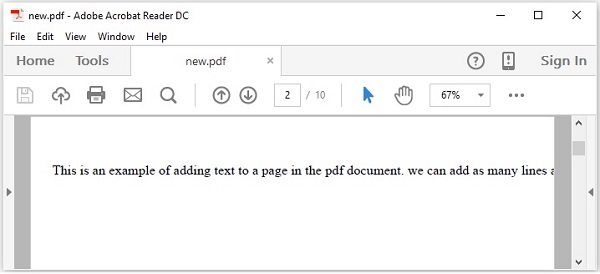
如果你仔细观察输出,你会注意到只显示了字符串的一部分。
为了在 PDF 中添加多行,你需要使用setLeading()方法设置行距,并在完成每一行后使用newline()方法换行。
步骤
以下是创建空文档并在其中向页面添加内容的步骤。
步骤 1:加载现有文档
您可以使用 PDDocument 类的 load() 方法加载现有文档。因此,实例化此类并加载所需的文档,如下所示。
File file = new File("Path of the document");
PDDocument doc = PDDocument.load(file);
步骤 2:获取所需的页面
您可以使用 getPage() 方法获取文档中所需的页面。通过将页面的索引传递给此方法来检索所需页面的对象,如下所示。
PDPage page = doc.getPage(1);
步骤 3:准备内容流
您可以使用名为PDPageContentStream类的对象插入各种数据元素。你需要将文档对象和页面对象传递给此类的构造函数,因此,通过传递在前面步骤中创建的这两个对象来实例化此类,如下所示。
PDPageContentStream contentStream = new PDPageContentStream(doc, page);
步骤 4:开始文本
在 PDF 文档中插入文本时,您可以使用PDPageContentStream类的beginText()和endText()方法指定文本的起始和结束点,如下所示。
contentStream.beginText(); ……………………….. code to add text content ……………………….. contentStream.endText();
因此,使用 beginText() 方法开始文本,如下所示。
contentStream.beginText();
步骤 5:设置文本的位置
使用 newLineAtOffset() 方法,您可以在页面上的内容流中设置位置。
//Setting the position for the line contentStream.newLineAtOffset(25, 700);
步骤 6:设置字体
您可以使用PDPageContentStream类的setFont()方法将文本的字体设置为所需的样式,如下所示,你需要将字体的类型和大小传递给此方法。
contentStream.setFont( font_type, font_size );
步骤 7:设置文本行距
您可以使用setLeading()方法设置文本行距,如下所示。
contentStream.setLeading(14.5f);
步骤 8:使用 newline() 插入多个字符串
您可以使用PDPageContentStream类的ShowText()方法插入多个字符串,通过使用newline()方法将它们分割,如下所示。
contentStream. ShowText(text1); contentStream.newLine(); contentStream. ShowText(text2);
步骤 9:结束文本
插入文本后,您需要使用 PDPageContentStream 类的 endText() 方法结束文本,如下所示。
contentStream.endText();
步骤 10:关闭 PDPageContentStream
使用 close() 方法关闭 PDPageContentStream 对象,如下所示。
contentstream.close();
步骤 11:保存文档
添加所需内容后,使用 PDDocument 类的 save() 方法保存 PDF 文档,如下面的代码块所示。
doc.save("Path");
步骤 12:关闭文档
最后,使用 PDDocument 类的 close() 方法关闭文档,如下所示。
doc.close();
示例
此示例演示了如何使用 PDFBox 在 PDF 中添加多行。将此程序保存在名为AddMultipleLines.java的文件中。
import java.io.File;
import java.io.IOException;
import org.apache.pdfbox.pdmodel.PDDocument;
import org.apache.pdfbox.pdmodel.PDPage;
import org.apache.pdfbox.pdmodel.PDPageContentStream;
import org.apache.pdfbox.pdmodel.font.PDType1Font;
public class AddMultipleLines {
public static void main(String args[]) throws IOException {
//Loading an existing document
File file = new File("C:/PdfBox_Examples/my_pdf.pdf");
PDDocument doc = document.load(file);
//Creating a PDF Document
PDPage page = doc.getPage(1);
PDPageContentStream contentStream = new PDPageContentStream(doc, page);
//Begin the Content stream
contentStream.beginText();
//Setting the font to the Content stream
contentStream.setFont( PDType1Font.TIMES_ROMAN, 16 );
//Setting the leading
contentStream.setLeading(14.5f);
//Setting the position for the line
contentStream.newLineAtOffset(25, 725);
String text1 = "This is an example of adding text to a page in the pdf document.
we can add as many lines";
String text2 = "as we want like this using the ShowText() method of the
ContentStream class";
//Adding text in the form of string
contentStream. ShowText(text1);
contentStream.newLine();
contentStream. ShowText(text2);
//Ending the content stream
contentStream.endText();
System.out.println("Content added");
//Closing the content stream
contentStream.close();
//Saving the document
doc.save(new File("C:/PdfBox_Examples/new.pdf"));
//Closing the document
doc.close();
}
}
使用以下命令从命令提示符编译并执行保存的 Java 文件。
javac AddMultipleLines.java java AddMultipleLines
执行后,上述程序将给定的文本添加到文档中并显示以下消息。
Content added
如果您在指定路径中验证 PDF 文档new.pdf,您可以观察到给定的内容已按多行添加到文档中,如下所示。
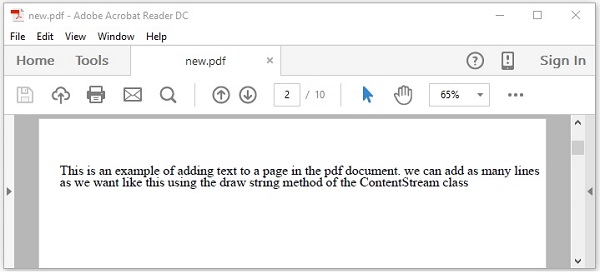
PDFBox - 读取文本
在上一章中,我们已经了解了如何将文本添加到现有的 PDF 文档中。在本章中,我们将讨论如何从现有的 PDF 文档中读取文本。
从现有 PDF 文档中提取文本
提取文本是 PDF box 库的主要功能之一。您可以使用PDFTextStripper类的getText()方法提取文本。此类从给定的 PDF 文档中提取所有文本。
以下是从现有 PDF 文档中提取文本的步骤。
步骤 1:加载现有的 PDF 文档
使用 PDDocument 类的静态方法 load() 加载现有的 PDF 文档。此方法接受文件对象作为参数,由于这是一个静态方法,因此您可以使用类名来调用它,如下所示。
File file = new File("path of the document")
PDDocument document = PDDocument.load(file);
步骤 2:实例化 PDFTextStripper 类
PDFTextStripper类提供从 PDF 文档检索文本的方法,因此,实例化此类,如下所示。
PDFTextStripper pdfStripper = new PDFTextStripper();
步骤 3:检索文本
您可以使用PDFTextStripper类的getText()方法读取/检索 PDF 文档中页面的内容。对于此方法,您需要将文档对象作为参数传递。此方法检索给定文档中的文本,并以 String 对象的形式返回它。
String text = pdfStripper.getText(document);
步骤 4:关闭文档
最后,使用PDDocument类的close()方法关闭文档,如下所示。
document.close();
示例
假设我们有一个 PDF 文档,其中包含一些文本,如下所示。
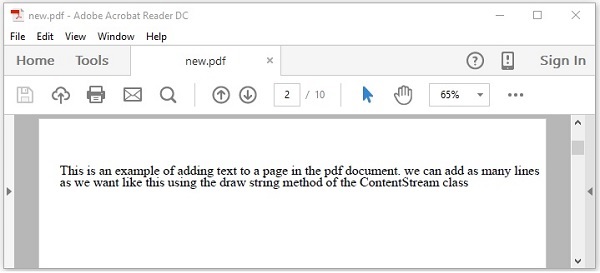
此示例演示了如何从上述 PDF 文档中读取文本。在这里,我们将创建一个 Java 程序并加载一个名为new.pdf的 PDF 文档,该文档保存在路径C:/PdfBox_Examples/中。将此代码保存在名为ReadingText.java的文件中。
import java.io.File;
import java.io.IOException;
import org.apache.pdfbox.pdmodel.PDDocument;
import org.apache.pdfbox.text.PDFTextStripper;
public class ReadingText {
public static void main(String args[]) throws IOException {
//Loading an existing document
File file = new File("C:/PdfBox_Examples/new.pdf");
PDDocument document = PDDocument.load(file);
//Instantiate PDFTextStripper class
PDFTextStripper pdfStripper = new PDFTextStripper();
//Retrieving text from PDF document
String text = pdfStripper.getText(document);
System.out.println(text);
//Closing the document
document.close();
}
}
使用以下命令从命令提示符编译并执行保存的 Java 文件。
javac ReadingText.java java ReadingText
执行后,上述程序从给定的 PDF 文档中检索文本并显示它,如下所示。
This is an example of adding text to a page in the pdf document. we can add as many lines as we want like this using the ShowText() method of the ContentStream class.
PDFBox - 插入图片
在上一章中,我们已经了解了如何从现有的 PDF 文档中提取文本。在本章中,我们将讨论如何将图像插入 PDF 文档。
将图像插入 PDF 文档
您可以使用PDImageXObject和PDPageContentStream类的createFromFile()和drawImage()方法将图像插入 PDF 文档。
以下是从现有 PDF 文档中提取文本的步骤。
步骤 1:加载现有的 PDF 文档
使用 PDDocument 类的静态方法 load() 加载现有的 PDF 文档。此方法接受文件对象作为参数,由于这是一个静态方法,因此您可以使用类名来调用它,如下所示。
File file = new File("path of the document")
PDDocument doc = PDDocument.load(file);
步骤 2:检索页面
在 PDF 文档中选择一个页面,并使用getPage()方法检索其页面对象,如下所示。
PDPage page = doc.getPage(0);
步骤 3:创建 PDImageXObject 对象
PDFBox 库中的PDImageXObject类表示一个图像。它提供执行与图像相关的操作所需的所有方法,例如,插入图像、设置其高度、设置其宽度等。
我们可以使用createFromFile()方法创建此类的对象。对于此方法,我们需要传递要添加的图像的路径(以字符串形式)以及需要将图像添加到其中的文档对象。
PDImageXObject pdImage = PDImageXObject.createFromFile("C:/logo.png", doc);
步骤 4:准备内容流
您可以使用名为PDPageContentStream类的对象插入各种数据元素。你需要将文档对象和页面对象传递给此类的构造函数,因此,通过传递在前面步骤中创建的这两个对象来实例化此类,如下所示。
PDPageContentStream contentStream = new PDPageContentStream(doc, page);
步骤 5:在 PDF 文档中绘制图像
您可以使用drawImage()方法在 PDF 文档中插入图像。对于此方法,您需要添加上面步骤中创建的图像对象以及图像所需的尺寸(宽度和高度),如下所示。
contentstream.drawImage(pdImage, 70, 250);
步骤 6:关闭 PDPageContentStream
使用 close() 方法关闭 PDPageContentStream 对象,如下所示。
contentstream.close();
步骤 7:保存文档
添加所需内容后,使用 PDDocument 类的 save() 方法保存 PDF 文档,如下面的代码块所示。
doc.save("Path");
步骤 8:关闭文档
最后,使用 PDDocument 类的 close() 方法关闭文档,如下所示。
doc.close();
示例
假设我们在路径C:/PdfBox_Examples/中有一个名为sample.pdf的 PDF 文档,其中包含空白页面,如下所示。
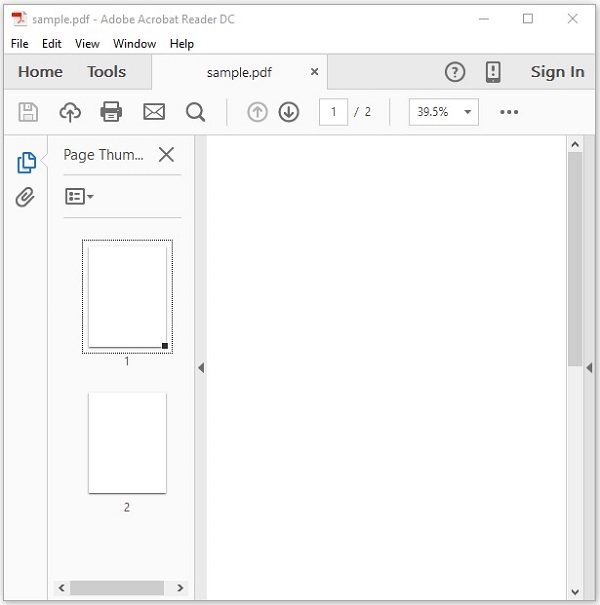
此示例演示了如何将图像添加到上述 PDF 文档的空白页面中。在这里,我们将加载名为sample.pdf的 PDF 文档并向其中添加图像。将此代码保存在名为InsertingImage.java的文件中。
import java.io.File;
import org.apache.pdfbox.pdmodel.PDDocument;
import org.apache.pdfbox.pdmodel.PDPage;
import org.apache.pdfbox.pdmodel.PDPageContentStream;
import org.apache.pdfbox.pdmodel.graphics.image.PDImageXObject;
public class InsertingImage {
public static void main(String args[]) throws Exception {
//Loading an existing document
File file = new File("C:/PdfBox_Examples/sample.pdf");
PDDocument doc = PDDocument.load(file);
//Retrieving the page
PDPage page = doc.getPage(0);
//Creating PDImageXObject object
PDImageXObject pdImage = PDImageXObject.createFromFile("C:/PdfBox_Examples/logo.png",doc);
//creating the PDPageContentStream object
PDPageContentStream contents = new PDPageContentStream(doc, page);
//Drawing the image in the PDF document
contents.drawImage(pdImage, 70, 250);
System.out.println("Image inserted");
//Closing the PDPageContentStream object
contents.close();
//Saving the document
doc.save("C:/PdfBox_Examples/sample.pdf");
//Closing the document
doc.close();
}
}
使用以下命令从命令提示符编译并执行保存的 Java 文件。
javac InsertingImage.java java InsertingImage
执行后,上述程序将图像插入给定 PDF 文档的指定页面中,并显示以下消息。
Image inserted
如果您验证文档sample.pdf,您可以观察到其中插入了一个图像,如下所示。
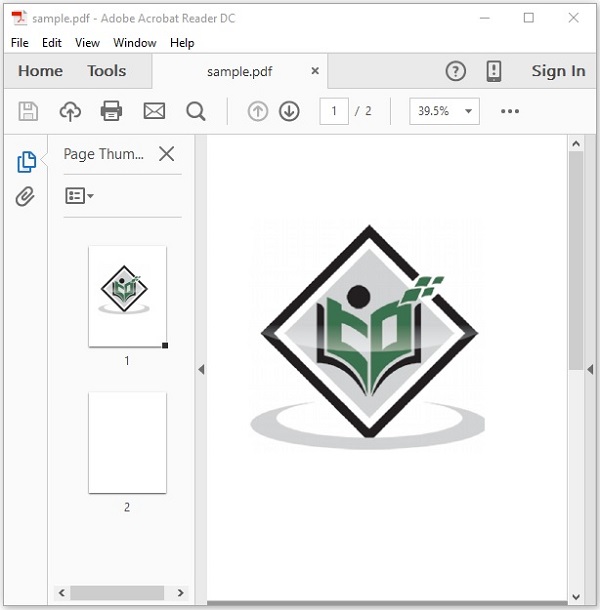
PDFBox - 加密 PDF 文档
在上一章中,我们已经了解了如何在 PDF 文档中插入图像。在本章中,我们将讨论如何加密 PDF 文档。
加密 PDF 文档
您可以使用StandardProtectionPolicy和AccessPermission 类提供的方法加密 PDF 文档。
AccessPermission类用于通过为 PDF 文档分配访问权限来保护它。使用此类,您可以限制用户执行以下操作。
- 打印文档
- 修改文档内容
- 复制或提取文档内容
- 添加或修改注释
- 填写交互式表单字段
- 提取文本和图形以供视力障碍人士访问
- 组装文档
- 以降级质量打印
StandardProtectionPolicy类用于为文档添加基于密码的保护。
以下是加密现有 PDF 文档的步骤。
步骤 1:加载现有的 PDF 文档
使用 PDDocument 类的静态方法 load() 加载现有的 PDF 文档。此方法接受文件对象作为参数,由于这是一个静态方法,因此您可以使用类名来调用它,如下所示。
File file = new File("path of the document")
PDDocument document = PDDocument.load(file);
步骤 2:创建 Access Permission 对象
实例化AccessPermission类,如下所示。
AccessPermission accessPermission = new AccessPermission();
步骤 3:创建 StandardProtectionPolicy 对象
通过传递所有者密码、用户密码和AccessPermission对象来实例化StandardProtectionPolicy类,如下所示。
StandardProtectionPolicy spp = new StandardProtectionPolicy("1234","1234",accessPermission);
步骤 4:设置加密密钥的长度
使用setEncryptionKeyLength()方法设置加密密钥长度,如下所示。
spp.setEncryptionKeyLength(128);
步骤 5:设置权限
使用StandardProtectionPolicy类的setPermissions()方法设置权限。此方法接受AccessPermission对象作为参数。
spp.setPermissions(accessPermission);
步骤 6:保护文档
您可以使用PDDocument类的protect()方法保护您的文档,如下所示。将StandardProtectionPolicy对象作为参数传递给此方法。
document.protect(spp);
步骤 7:保存文档
添加所需内容后,使用PDDocument类的save()方法保存 PDF 文档,如下面的代码块所示。
document.save("Path");
步骤 8:关闭文档
最后,使用PDDocument类的close()方法关闭文档,如下所示。
document.close();
示例
假设我们在路径C:/PdfBox_Examples/中有一个名为sample.pdf的 PDF 文档,其中包含空白页面,如下所示。

此示例演示了如何加密上述 PDF 文档。在这里,我们将加载名为sample.pdf的 PDF 文档并对其进行加密。将此代码保存在名为EncriptingPDF.java的文件中。
import java.io.File;
import org.apache.pdfbox.pdmodel.PDDocument;
import org.apache.pdfbox.pdmodel.encryption.AccessPermission;
import org.apache.pdfbox.pdmodel.encryption.StandardProtectionPolicy;
public class EncriptingPDF {
public static void main(String args[]) throws Exception {
//Loading an existing document
File file = new File("C:/PdfBox_Examples/sample.pdf");
PDDocument document = PDDocument.load(file);
//Creating access permission object
AccessPermission ap = new AccessPermission();
//Creating StandardProtectionPolicy object
StandardProtectionPolicy spp = new StandardProtectionPolicy("1234", "1234", ap);
//Setting the length of the encryption key
spp.setEncryptionKeyLength(128);
//Setting the access permissions
spp.setPermissions(ap);
//Protecting the document
document.protect(spp);
System.out.println("Document encrypted");
//Saving the document
document.save("C:/PdfBox_Examples/sample.pdf");
//Closing the document
document.close();
}
}
使用以下命令从命令提示符编译并执行保存的 Java 文件。
javac EncriptingPDF.java java EncriptingPDF
执行后,上述程序会加密给定的 PDF 文档并显示以下消息。
Document encrypted
如果您尝试打开文档sample.pdf,则无法打开,因为它已加密。相反,它会提示您输入密码以打开文档,如下所示。
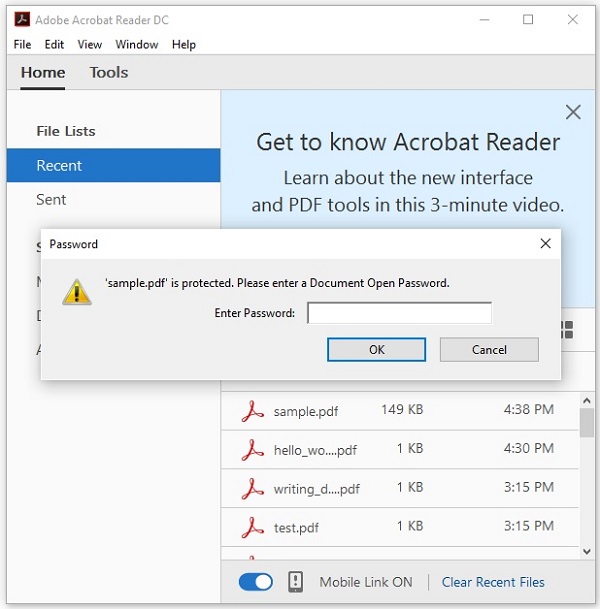
PDFBox - PDF 文档中的 JavaScript
在上一章中,我们学习了如何将图像插入 PDF 文档。在本章中,我们将讨论如何向 PDF 文档添加 JavaScript。
向 PDF 文档添加 JavaScript
您可以使用PDActionJavaScript类向 PDF 文档添加 JavaScript 操作。这表示一个 JavaScript 操作。
以下是向现有 PDF 文档添加 JavaScript 操作的步骤。
步骤 1:加载现有的 PDF 文档
使用 PDDocument 类的静态方法 load() 加载现有的 PDF 文档。此方法接受文件对象作为参数,由于这是一个静态方法,因此您可以使用类名来调用它,如下所示。
File file = new File("path of the document")
PDDocument document = PDDocument.load(file);
步骤 2:创建 PDActionJavaScript 对象
实例化PDActionJavaScript对象,如下所示。对于此类的构造函数,请以字符串形式传递所需的 JavaScript,如下所示。
String javaScript = "app.alert( {cMsg: 'this is an example', nIcon: 3,"
+ " nType: 0,cTitle: 'PDFBox Javascript example' } );";
PDActionJavaScript PDAjavascript = new PDActionJavaScript(javaScript);
步骤 3:将 Java 脚本嵌入文档
将所需的字符串嵌入到 PDF 文档中,如下所示。
document.getDocumentCatalog().setOpenAction(PDAjavascript);
步骤 4:保存文档
添加所需内容后,使用PDDocument类的save()方法保存 PDF 文档,如下面的代码块所示。
document.save("Path");
步骤 5:关闭文档
最后,使用PDDocument类的close()方法关闭文档,如下所示。
document.close();
示例
假设我们在路径C:/PdfBox_Examples/中有一个名为sample.pdf的 PDF 文档,其中包含空白页面,如下所示。

此示例演示了如何将 JavaScript 嵌入到上述 PDF 文档中。在这里,我们将加载名为sample.pdf的 PDF 文档并将 JavaScript 嵌入到其中。将此代码保存在名为AddJavaScript.java的文件中。
import java.io.File;
import org.apache.pdfbox.pdmodel.PDDocument;
import org.apache.pdfbox.pdmodel.interactive.action.PDActionJavaScript;
public class AddJavaScript {
public static void main(String args[]) throws Exception {
//Loading an existing file
File file = new File("C:/PdfBox_Examples/new.pdf");
PDDocument document = PDDocument.load(file);
String javaScript = "app.alert( {cMsg: 'this is an example', nIcon: 3,"
+ " nType: 0, cTitle: 'PDFBox Javascript example’} );";
//Creating PDActionJavaScript object
PDActionJavaScript PDAjavascript = new PDActionJavaScript(javaScript);
//Embedding java script
document.getDocumentCatalog().setOpenAction(PDAjavascript);
//Saving the document
document.save( new File("C:/PdfBox_Examples/new.pdf") );
System.out.println("Data added to the given PDF");
//Closing the document
document.close();
}
}
使用以下命令从命令提示符编译并执行保存的 Java 文件。
javac AddJavaScript.java java AddJavaScript
执行后,上述程序将 JavaScript 嵌入到给定的 PDF 文档中并显示以下消息。
Data added to the given PDF
如果您尝试打开文档new.pdf,它将显示一个警报消息,如下所示。
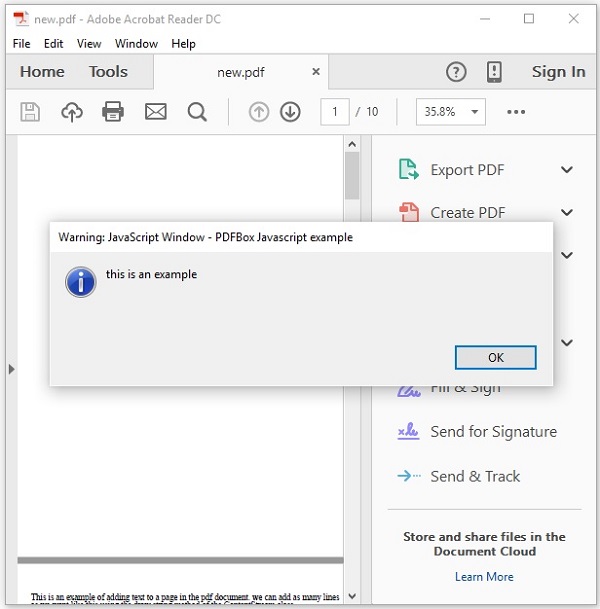
PDFBox - 分割 PDF 文档
在上一章中,我们已经了解了如何向 PDF 文档添加 JavaScript。现在让我们学习如何将给定的 PDF 文档拆分为多个文档。
拆分 PDF 文档中的页面
您可以使用名为 Splitter 的类将给定的 PDF 文档拆分为多个 PDF 文档。此类用于将给定的 PDF 文档拆分为几个其他文档。
以下是拆分现有 PDF 文档的步骤
步骤 1:加载现有的 PDF 文档
使用 PDDocument 类的静态方法 load() 加载现有的 PDF 文档。此方法接受文件对象作为参数,由于这是一个静态方法,因此您可以使用类名来调用它,如下所示。
File file = new File("path of the document")
PDDocument document = PDDocument.load(file);
步骤 2:实例化 Splitter 类
名为Splitter的类包含用于拆分给定 PDF 文档的方法,因此,实例化此类,如下所示。
Splitter splitter = new Splitter();
步骤 3:拆分 PDF 文档
您可以使用Splitter类的Split()方法拆分给定文档。此方法接受PDDocument类的对象作为参数。
List<PDDocument> Pages = splitter.split(document);
split()方法将给定文档的每一页拆分为一个单独的文档,并将所有这些文档以列表的形式返回。
步骤 4:创建 Iterator 对象
为了遍历文档列表,您需要获取上面步骤中获取的列表的迭代器对象,可以使用listIterator()方法获取列表的迭代器对象,如下所示。
Iterator<PDDocument> iterator = Pages.listIterator();
步骤 5:关闭文档
最后,使用PDDocument类的close()方法关闭文档,如下所示。
document.close();
示例
假设在路径C:\PdfBox_Examples\中有一个名为sample.pdf的PDF文档,该文档包含两页——一页包含图像,另一页包含文本,如下所示。
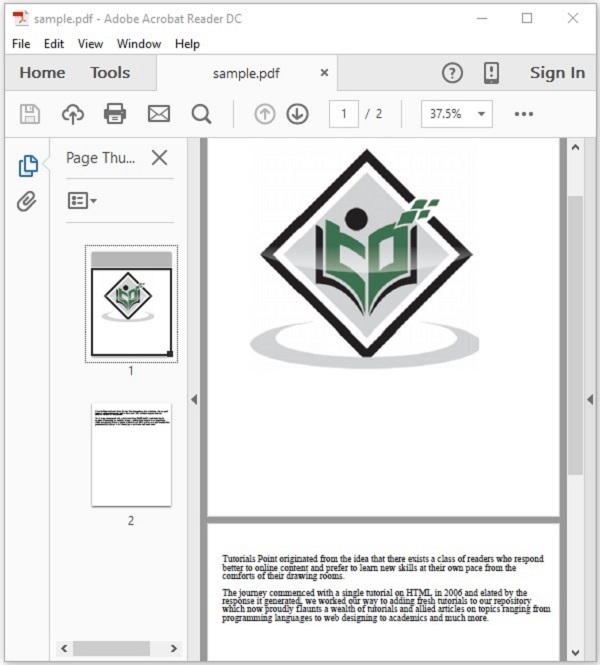
此示例演示如何拆分上述PDF文档。在这里,我们将名为sample.pdf的PDF文档拆分为两个不同的文档sample1.pdf和sample2.pdf。将此代码保存在名为SplitPages.java的文件中。
import org.apache.pdfbox.multipdf.Splitter;
import org.apache.pdfbox.pdmodel.PDDocument;
import java.io.File;
import java.io.IOException;
import java.util.List;
import java.util.Iterator;
public class SplitPages {
public static void main(String[] args) throws IOException {
//Loading an existing PDF document
File file = new File("C:/PdfBox_Examples/sample.pdf");
PDDocument document = PDDocument.load(file);
//Instantiating Splitter class
Splitter splitter = new Splitter();
//splitting the pages of a PDF document
List<PDDocument> Pages = splitter.split(document);
//Creating an iterator
Iterator<PDDocument> iterator = Pages.listIterator();
//Saving each page as an individual document
int i = 1;
while(iterator.hasNext()) {
PDDocument pd = iterator.next();
pd.save("C:/PdfBox_Examples/sample"+ i++ +".pdf");
}
System.out.println("Multiple PDF’s created");
document.close();
}
}
使用以下命令从命令提示符编译并执行保存的 Java 文件
javac SplitPages.java java SplitPages
执行后,上述程序会加密给定的 PDF 文档并显示以下消息。
Multiple PDF’s created
如果您验证给定的路径,您可以观察到创建了多个名为sample1和sample2的PDF,如下所示。
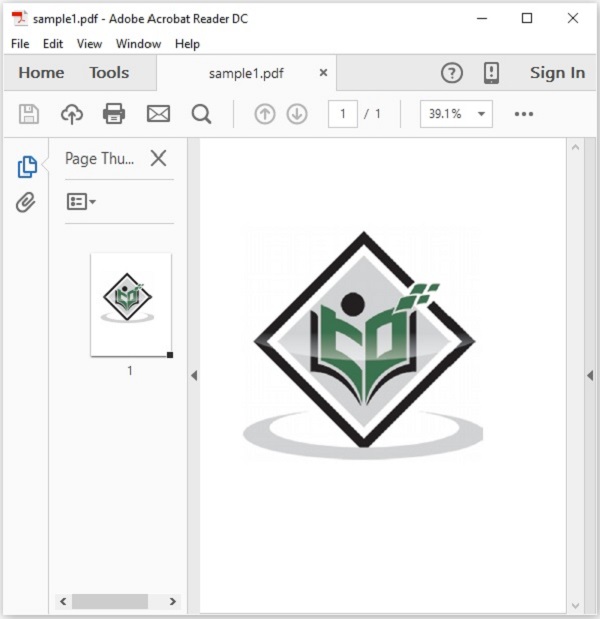
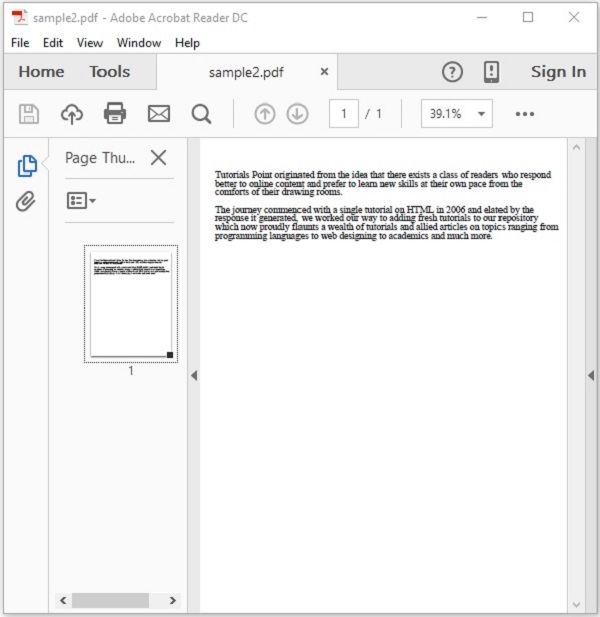
PDFBox - 合并多个PDF文档
在上一章中,我们已经了解了如何将给定的PDF文档拆分为多个文档。现在让我们学习如何将多个PDF文档合并为一个文档。
合并多个 PDF 文档
您可以使用名为PDFMergerUtility类的类将多个PDF文档合并为单个PDF文档,此类提供方法将两个或多个PDF文档合并为单个PDF文档。
以下是合并多个PDF文档的步骤。
步骤1:实例化PDFMergerUtility类
如下所示实例化合并实用程序类。
PDFMergerUtility PDFmerger = new PDFMergerUtility();
步骤2:设置目标文件
如下所示,使用setDestinationFileName()方法设置目标文件。
PDFmerger.setDestinationFileName("C:/PdfBox_Examples/data1/merged.pdf");
步骤3:设置源文件
如下所示,使用addSource()方法设置源文件。
File file = new File("path of the document")
PDFmerger.addSource(file);
步骤4:合并文档
如下所示,使用PDFmerger类的mergeDocuments()方法合并文档。
PDFmerger.mergeDocuments();
示例
假设我们在路径C:\PdfBox_Examples\中有两个PDF文档——sample1.pdf和sample2.pdf,如下所示。

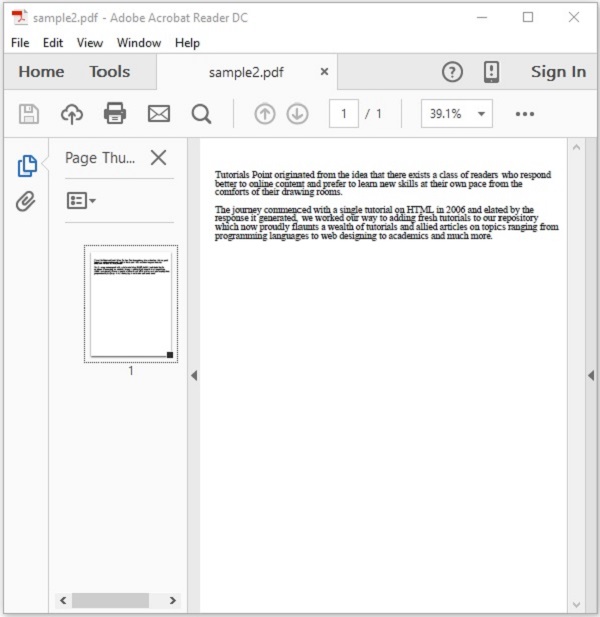
此示例演示如何合并上述PDF文档。在这里,我们将名为sample1.pdf和sample2.pdf的PDF文档合并为单个PDF文档merged.pdf。将此代码保存在名为MergePDFs.java的文件中。
import org.apache.pdfbox.multipdf.PDFMergerUtility;
import java.io.File;
import java.io.IOException;
public class MergePDFs {
public static void main(String[] args) throws IOException {
File file1 = new File("C:\\EXAMPLES\\Demo1.pdf");
File file2 = new File("C:\\EXAMPLES\\Demo2.pdf");
//Instantiating PDFMergerUtility class
PDFMergerUtility PDFmerger = new PDFMergerUtility();
//Setting the destination file
PDFmerger.setDestinationFileName("C:\\Examples\\merged.pdf");
//adding the source files
PDFmerger.addSource(file1);
PDFmerger.addSource(file2);
//Merging the two documents
PDFmerger.mergeDocuments();
System.out.println("Documents merged");
}
}
使用以下命令从命令提示符编译并执行保存的 Java 文件。
javac MergePDFs.java java MergePDFs
执行后,上述程序会加密给定的 PDF 文档并显示以下消息。
Documents merged
如果您验证给定的路径,您可以观察到创建了一个名为merged.pdf的PDF文档,并且其中包含两个源文档的页面,如下所示。
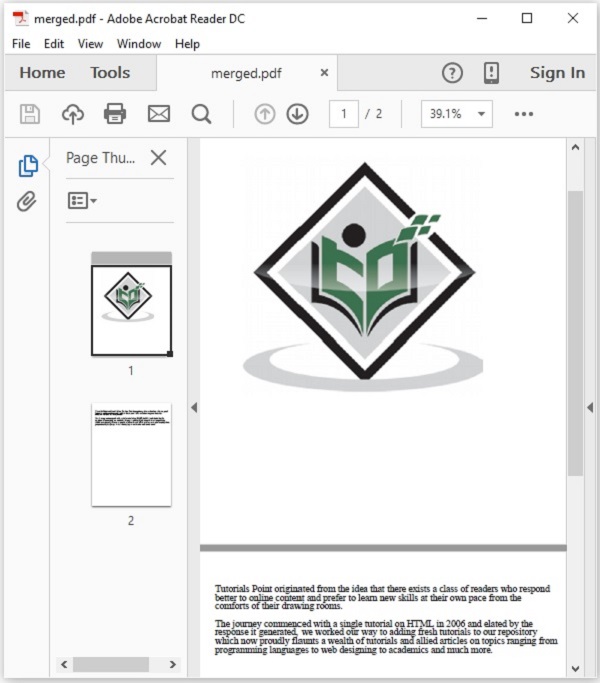
PDFBox - 将 PDF 转换为图片
在上一章中,我们已经了解了如何合并多个PDF文档。在本章中,我们将了解如何从PDF文档的页面中提取图像。
从PDF文档生成图像
PDFBox库为您提供了一个名为PDFRenderer的类,该类将PDF文档渲染为AWT BufferedImage。
以下是从PDF文档生成图像的步骤。
步骤 1:加载现有的 PDF 文档
使用 PDDocument 类的静态方法 load() 加载现有的 PDF 文档。此方法接受文件对象作为参数,由于这是一个静态方法,因此您可以使用类名来调用它,如下所示。
File file = new File("path of the document")
PDDocument document = PDDocument.load(file);
步骤2:实例化PDFRenderer类
名为PDFRenderer的类将PDF文档渲染为AWT BufferedImage。因此,您需要如下所示实例化此类。此类的构造函数接受一个文档对象;将上一步骤中创建的文档对象传递给它,如下所示。
PDFRenderer renderer = new PDFRenderer(document);
步骤3:从PDF文档渲染图像
您可以使用Renderer类的renderImage()方法渲染特定页面中的图像,为此方法,您需要传递要渲染图像所在的页面的索引。
BufferedImage image = renderer.renderImage(0);
步骤4:将图像写入文件
您可以使用write()方法将上一步中渲染的图像写入文件。为此方法,您需要传递三个参数:
- 渲染的图像对象。
- 表示图像类型(jpg或png)的字符串。
- 您需要将提取的图像保存到的文件对象。
ImageIO.write(image, "JPEG", new File("C:/PdfBox_Examples/myimage.jpg"));
步骤 5:关闭文档
最后,使用PDDocument类的close()方法关闭文档,如下所示。
document.close();
示例
假设我们在路径C:\PdfBox_Examples\中有一个PDF文档——sample.pdf,并且其第一页包含一个图像,如下所示。
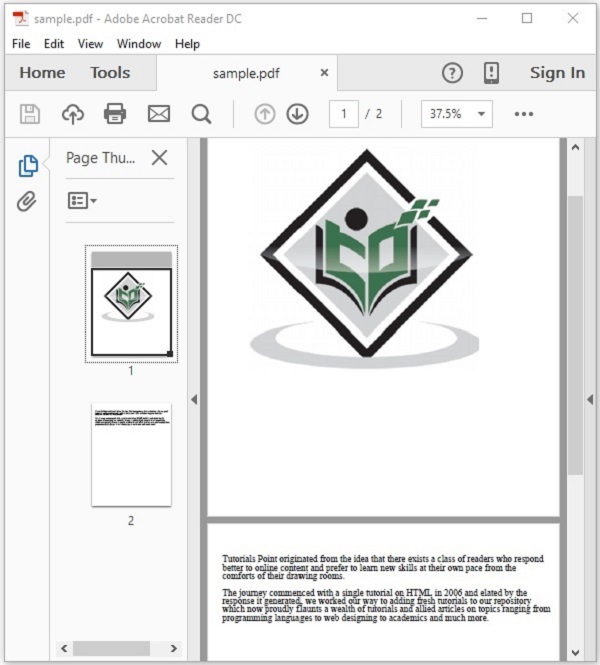
此示例演示如何将上述PDF文档转换为图像文件。在这里,我们将检索PDF文档第1页中的图像并将其保存为myimage.jpg。将此代码保存为PdfToImage.java
import java.awt.image.BufferedImage;
import java.io.File;
import javax.imageio.ImageIO;
import org.apache.pdfbox.pdmodel.PDDocument;
import org.apache.pdfbox.rendering.PDFRenderer;
public class PdfToImage {
public static void main(String args[]) throws Exception {
//Loading an existing PDF document
File file = new File("C:/PdfBox_Examples/sample.pdf");
PDDocument document = PDDocument.load(file);
//Instantiating the PDFRenderer class
PDFRenderer renderer = new PDFRenderer(document);
//Rendering an image from the PDF document
BufferedImage image = renderer.renderImage(0);
//Writing the image to a file
ImageIO.write(image, "JPEG", new File("C:/PdfBox_Examples/myimage.jpg"));
System.out.println("Image created");
//Closing the document
document.close();
}
}
使用以下命令从命令提示符编译并执行保存的 Java 文件。
javac PdfToImage.java java PdfToImage
执行后,上述程序检索给定PDF文档中的图像,并显示以下消息。
Image created
如果您验证给定的路径,您可以观察到图像已生成并保存为myimage.jpg,如下所示。

PDFBox - 添加矩形
本章将教您如何在PDF文档的页面中创建彩色框。
在PDF文档中创建框
您可以使用PDPageContentStream类的addRect()方法在PDF页面中添加矩形框。
以下是如何在PDF文档的页面中创建矩形形状的步骤。
步骤 1:加载现有的 PDF 文档
使用 PDDocument 类的静态方法 load() 加载现有的 PDF 文档。此方法接受文件对象作为参数,由于这是一个静态方法,因此您可以使用类名来调用它,如下所示。
File file = new File("path of the document")
PDDocument document = PDDocument.load(file);
步骤2:获取页面对象
您需要使用PDDocument类的getPage()方法检索要在其中添加矩形的所需页面的PDPage对象。为此方法,您需要传递要在其中添加矩形的页面的索引。
PDPage page = document.getPage(0);
步骤 3:准备内容流
您可以使用名为PDPageContentStream类的对象插入各种数据元素。你需要将文档对象和页面对象传递给此类的构造函数,因此,通过传递在前面步骤中创建的这两个对象来实例化此类,如下所示。
PDPageContentStream contentStream = new PDPageContentStream(document, page);
步骤4:设置非描边颜色
您可以使用PDPageContentStream类的setNonStrokingColor()方法将非描边颜色设置为矩形。为此方法,您需要将所需颜色作为参数传递,如下所示。
contentStream.setNonStrokingColor(Color.DARK_GRAY);
步骤5:绘制矩形
使用addRect()方法绘制具有所需尺寸的矩形。为此方法,您需要传递要添加的矩形的尺寸,如下所示。
contentStream.addRect(200, 650, 100, 100);
步骤6:填充矩形
PDPageContentStream类的fill()方法使用所需颜色填充指定尺寸之间的路径,如下所示。
contentStream.fill();
步骤7:关闭文档
最后,使用PDDocument类的close()方法关闭文档,如下所示。
document.close();
示例
假设我们在路径C:\PdfBox_Examples\中有一个名为blankpage.pdf的PDF文档,并且它包含一个空白页面,如下所示。
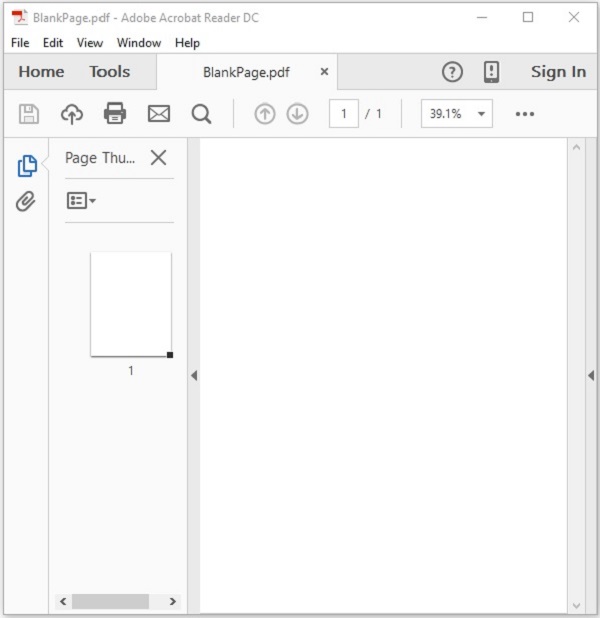
此示例演示如何在PDF文档中创建/插入矩形。在这里,我们将在空白PDF中创建一个框。将此代码保存为AddRectangles.java。
import java.awt.Color;
import java.io.File;
import org.apache.pdfbox.pdmodel.PDDocument;
import org.apache.pdfbox.pdmodel.PDPage;
import org.apache.pdfbox.pdmodel.PDPageContentStream;
public class ShowColorBoxes {
public static void main(String args[]) throws Exception {
//Loading an existing document
File file = new File("C:/PdfBox_Examples/BlankPage.pdf");
PDDocument document = PDDocument.load(file);
//Retrieving a page of the PDF Document
PDPage page = document.getPage(0);
//Instantiating the PDPageContentStream class
PDPageContentStream contentStream = new PDPageContentStream(document, page);
//Setting the non stroking color
contentStream.setNonStrokingColor(Color.DARK_GRAY);
//Drawing a rectangle
contentStream.addRect(200, 650, 100, 100);
//Drawing a rectangle
contentStream.fill();
System.out.println("rectangle added");
//Closing the ContentStream object
contentStream.close();
//Saving the document
File file1 = new File("C:/PdfBox_Examples/colorbox.pdf");
document.save(file1);
//Closing the document
document.close();
}
}
使用以下命令从命令提示符编译并执行保存的 Java 文件。
javac AddRectangles.java java AddRectangles
执行后,上述程序在PDF文档中创建一个矩形,并显示以下图像。
Rectangle created
如果您验证给定的路径并打开保存的文档——colorbox.pdf,您可以观察到其中插入了一个框,如下所示。
